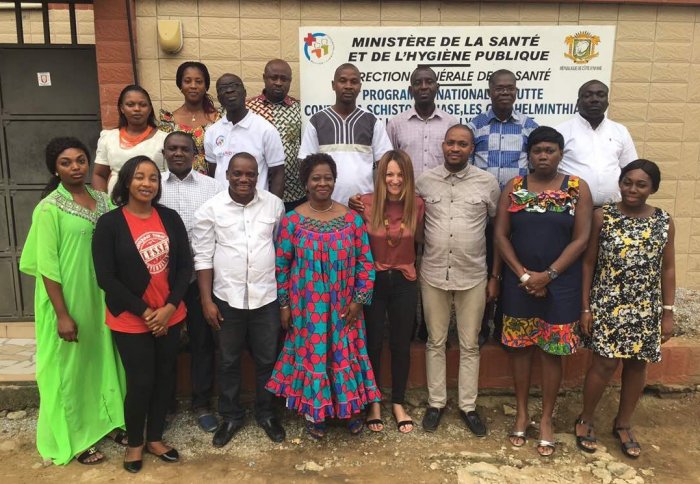Strengthening health systems to tackle schistosomiasis

SCI's Nadia Ben Meriem with the Côte d’Ivoire Ministry of Health team
SCI has been working with the Ministry of Health in Cote d'Ivoire to strengthen and develop its health systems to help combat schistosomiasis.
The World Health Organization has identified six key building blocks which make up a strong health system: leadership and governance; health care financing; health workforce; medical products and technologies; information and research; and service delivery.
However, during the recent Ebola outbreak in West Africa, a key problem was highlighted: a lack of strong leadership and governance can result in the health systems of a country quickly deteriorating and in turn, the health of a population becoming threatened. It appears that without strengthening leadership and governance first, the remaining pillars of a strong health system will fail to exist.
Numerous studies have been published on the importance of leadership training for Ministry of Health (MoH) staff members, however teaching on the topic is unfortunately not often recognised as being a key part in tackling health issues and can be excluded from strategies to improve health in these countries.
The team at SCI has recognised this problem, and has focused one of its key operational research projects on the development and evaluation of a leadership training course. It has been designed for MoH staff members working on treatment programmes against neglected tropical diseases (NTDs) in the countries SCI supports.
The training will aim to ensure that anyone working in a healthcare system can feel empowered to influence. It is then expected that they will become a catalyst for change and lead others towards a shared goal.
The research will evaluate whether the effective delivery of the training course can contribute to a change of practice and/or behaviour; to improve the management of treatment programmes against schistosomiasis; and to ensure that they programmes are more sustainable through greater ownership.
Nadia Ben Meriem, SCI Programme Advisor for Côte d’Ivoire and research project lead says: “It is our ambition to strengthen health systems in the countries we work with, to empower our in-country partners and give them the confidence to take the lead in their treatment programmes.”
The leadership training commenced in July 2017 and feedback has been positive so far, with the Côte d’Ivoire MoH NTD Programme Director Coordinator, Dr Aboulaye Meite, commenting: “With this training, I feel I have gained confidence. The training captured the attention of the audience during all sessions, with great examples that were easy to follow, allowing all to participate and interact.”
The research will conclude in late 2018, with research findings to be published in 2019.
Article text (excluding photos or graphics) © Imperial College London.
Photos and graphics subject to third party copyright used with permission or © Imperial College London.
Reporter
Press Office
Communications and Public Affairs
- Email: press.office@imperial.ac.uk
